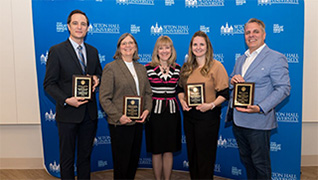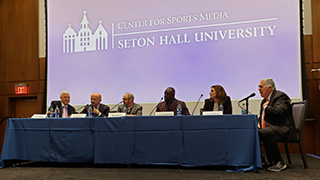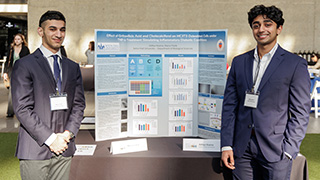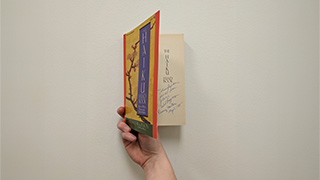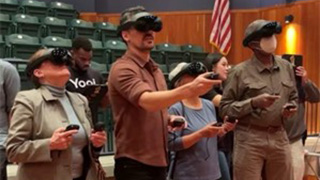Professor Madison Krall Receives Dissertation Award
Thursday, February 22, 2024
 Assistant Professor of Communication Madison Krall, Ph.D., received the Cheris Kramerae Dissertation Award from the Organization for the Study
of Communication, Language, and Gender (OSCLG) for her dissertation "U.S. Medical
Controversy and Its Discursive Legacy in the Mid-Twentieth Century Thalidomide Disaster."
Assistant Professor of Communication Madison Krall, Ph.D., received the Cheris Kramerae Dissertation Award from the Organization for the Study
of Communication, Language, and Gender (OSCLG) for her dissertation "U.S. Medical
Controversy and Its Discursive Legacy in the Mid-Twentieth Century Thalidomide Disaster."
"I am deeply honored to have been selected for this particular award, not only because I have a tremendous amount of respect for the Organization for the Study of Communication, Language, and Gender, but also because two of my mentors from the University of Utah, Julia Moore, Ph.D., and Robin Jensen, Ph.D., both also received this award in the past," said Krall. "The award feels extra special because they are two scholars who I hold in the highest regard, and they both supported me in different ways on my dissertation project."
The award, named for OSCLG founding member Cheris Kramarae, recognizes an outstanding dissertation in the field of communication, language, and gender. The OSCLG has sought to provide a forum for professional discussion, research presentation and demonstration of creative projects in communication, language and gender and to promote recognition of those doing work in this area.
"One of the best parts of receiving this reward is reflected in the support I received from my department and the greater Seton Hall University community when they heard the good news. Both my colleagues and students alike were excited to congratulate me on this achievement, which I think showcases the unique relationships I’ve fostered here through not only service opportunities, but through classroom interactions with graduates and undergraduates as well."
Krall’s dissertation outlined the role regulatory rhetoric has played in shaping United States medical policy and public discourses related to controversial drugs such as thalidomide.
"My original goal when selecting my dissertation topic was to better understand the thalidomide disaster because it is one of the famed medical tragedies of the twentieth century, likened to the Titanic, and yet very few people were familiar with the drug thalidomide itself," said Krall.
Krall is excited about the opportunity to serve the OSCLG as a member of the award committee.
"Winning this award prompted me to volunteer to be on next year's award committee, and I am hoping to submit something to their 47th Annual Conference, which will be held next October under the theme of 'The Feminist Frontier: Reimagining and Reenergizing for the Future,'" noted Krall. "The organization also supports the peer-reviewed journal Women & Language, where one day I hope to publish my own work."
Krall’s research centers around health and science communication, rhetorical history, gender studies, and the media – an area she continues to explore alongside her professor duties at Seton Hall.
About the College of Human Development, Culture, and Media
Launched in Summer 2023, Seton Hall’s College of Human Development, Culture, and Media (CHDCM) embodies the University’s commitment to pedagogical innovation, intellectual ferment and community engagement. Uniting scholars and students from four dynamic departments — Communication, Media, and the Arts; Education Leadership, Management, and Policy; Educational Studies; and Professional Psychology and Family Therapy — the College is the new home of cutting-edge, transdisciplinary inquiry into the stickiest problems of our time.
The faculty, staff and students of the College seek to improve the human condition by collaborating across distinct fields that uniquely complement one another, thereby preparing the next generation of dynamic leaders poised to tackle contemporary social challenges and opportunities. Expression underpins all facets of the integrated College’s portfolio — media as a form of education and artistic expression; teaching and learning as modes of creative expression; expression and expressibility as critical to counseling and therapeutic treatment; and self-expression as a vehicle of social agency.
Categories: Arts and Culture, Education, Research

